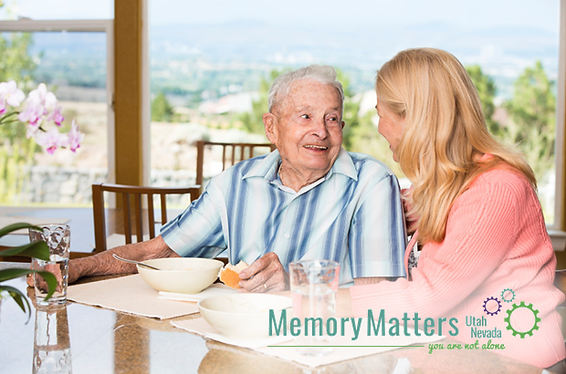As their disease progresses, people with Alzheimer’s sometimes reach a point where food and eating no longer matters. The people caring for them need to be one step ahead and as clever as possible.
Alzheimer’s disease and eating challenges often go hand in hand. As Alzheimer’s progresses, poor nutrition can aggravate confusion and lead to physical weakness, as well as increase the risk of infection and other health concerns.
If you’re caring for a loved one who has Alzheimer’s, understand what causes eating problems and how you can encourage good nutrition.
Consider Underlying Conditions
If your loved one is having trouble eating, check for underlying problems, such as:
- Oral problems. Make sure dentures fit properly and are being used. Check for mouth sores or other oral or dental issues.
- Medication effects. Many medications decrease appetite, including some drugs used to treat Alzheimer’s. If you think medications are contributing to eating problems, ask your loved one’s doctor about substitutions.
- Chronic conditions. Diabetes, heart disease, digestive problems and depression can dampen interest in eating. Constipation can have the same effect. Treating these or other underlying conditions might improve your loved one’s appetite. Also, consider talking to your loved one’s doctor about removing dietary restrictions.
Acknowledge Declining Skills and Senses
In the early stages of Alzheimer’s, your loved one might forget to eat or lose the skills needed to prepare proper meals. Call to remind him or her to eat or help with food preparation. If you make meals in advance, be sure to review how to unwrap and reheat them. You might also consider using a meal delivery service.
In addition, your loved one’s sense of smell and taste might begin to diminish, which can affect interest in eating.
As Alzheimer’s progresses, your loved one might forget table manners and eat from others’ plates or out of serving bowls. Changes in the brain might cause him or her to lose impulse control and judgment and, in turn, eat anything in sight — including nonfood items. During the later stages of the disease, difficulty swallowing is common.
Expect Agitation and Distraction
Agitation and other signs and symptoms of Alzheimer’s can make it difficult to sit still long enough to eat a meal. Distractions at mealtime might make this even worse. To reduce distractions, turn off the TV, radio and telephone ringer. Put your cellphone on vibrate. You might also clear the table of any unnecessary items.
If your loved one needs to pace, try cutting a sandwich into quarters and giving him or her a section while he or she walks.
Discourage your loved one from drinking alcoholic beverages. Although alcohol might stimulate the appetite, it can lead to confusion and agitation as well as contribute to falls.
Get Visual
Use white dishes to help your loved one distinguish the food from the plate. Similarly, use placemats of a contrasting color to help distinguish the plate from the table. Stick with solid colors, though. Patterned plates, bowls and linens might be confusing.
Try Large-handled Utensils
To prevent slipping, apply suction cups to the bottom of plates or use placemats that have traction on both sides. You could also make placemats from a roll of the rubbery mesh typically used to line shelves. Sometimes bowls are easier to use than plates.
Likewise, spoons might be easier to handle than forks. The larger the spoon’s handle, the better. Try bendable straws or lidded cups for liquids.
Offer Foods One at a Time
If your loved one is overwhelmed by an entire plate of food, place one type of food at a time on the plate. You could also offer several small meals throughout the day, rather than three larger ones.
Cut food into bite-sized portions. Finger foods are even easier — but avoid foods that can be tough to chew and swallow, such as nuts, popcorn and raw carrots.
Take Your Time
Don’t rush mealtimes. Remind your loved one to chew and swallow carefully, and allow him or her as much time as necessary.
Encourage your loved one to follow your actions, such as holding a fork or drinking from a cup — or gently place your hand over your loved one’s hand to hold a utensil and bring food to his or her mouth.
Sneak in Extra Nutrition
If you’re having a hard time getting your loved one to eat enough, prepare favorite foods. Avoid diet foods. Serve a filling breakfast or several light breakfasts in a row. You might also offer high-calorie snacks — such as protein milkshakes. Consult the doctor if sudden weight loss occurs.
Ensuring good nutrition in Alzheimer’s can be a challenge, but it’s worthwhile. Good nutrition can help your loved one better cope — both physically and emotionally — with the challenges of Alzheimer’s.

